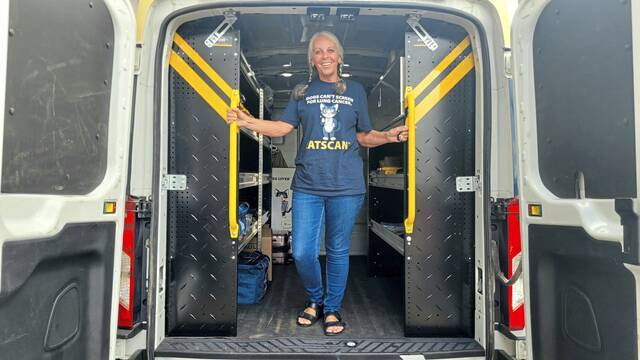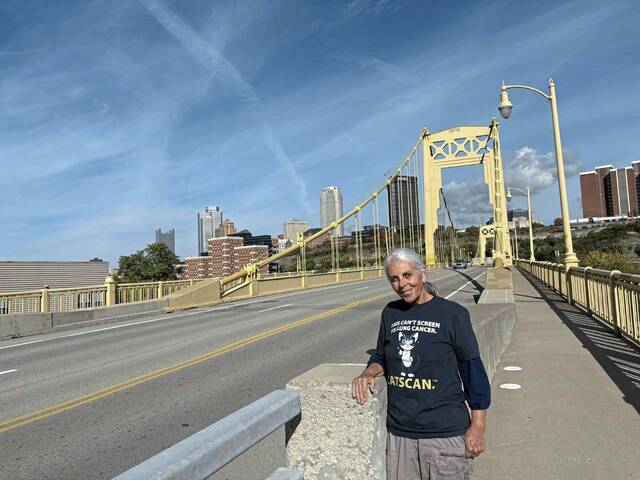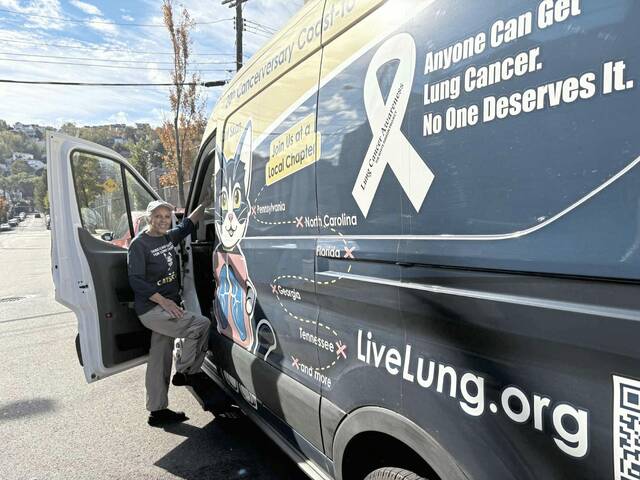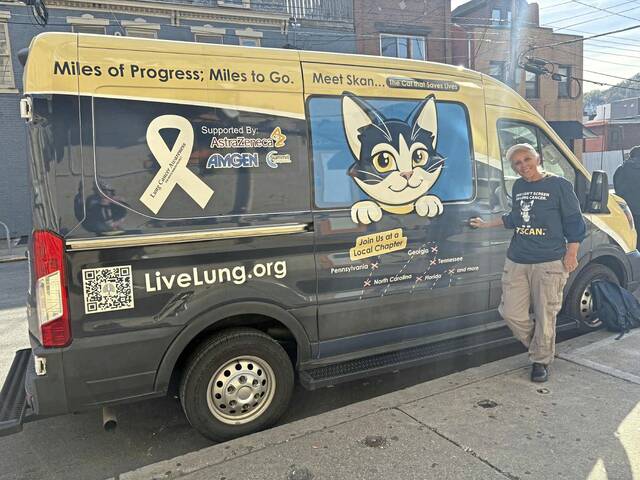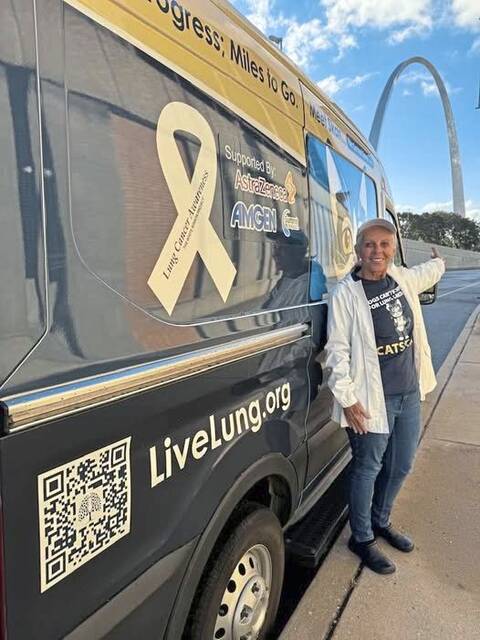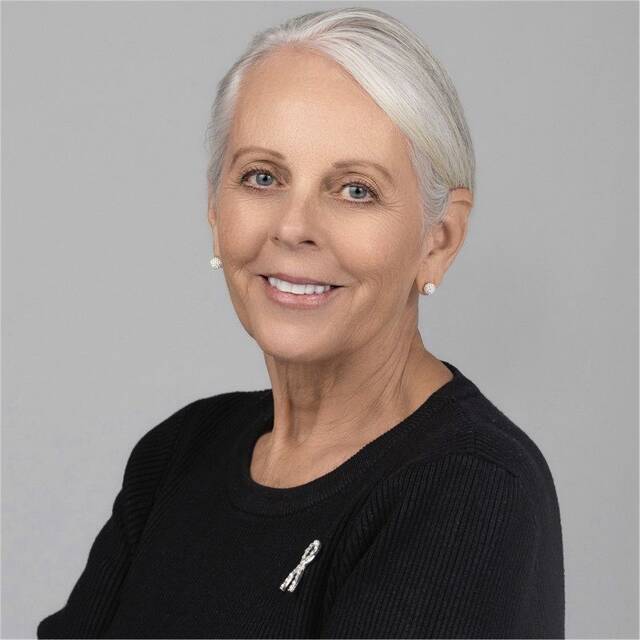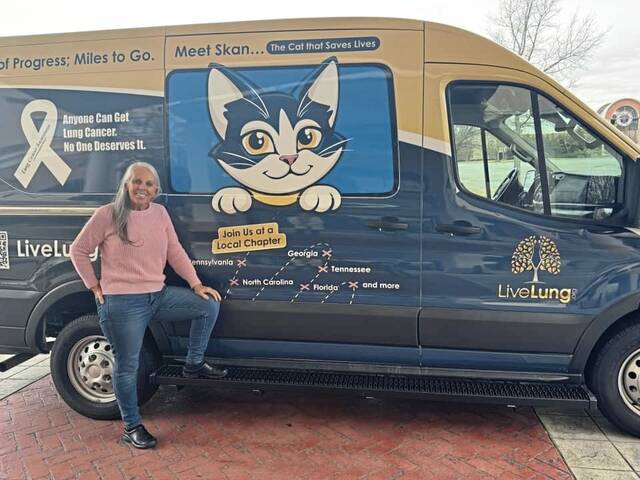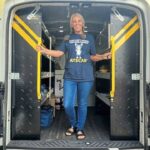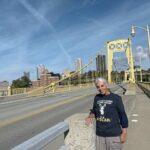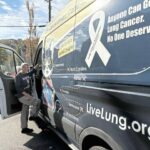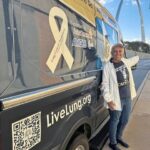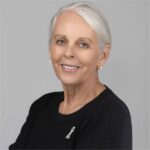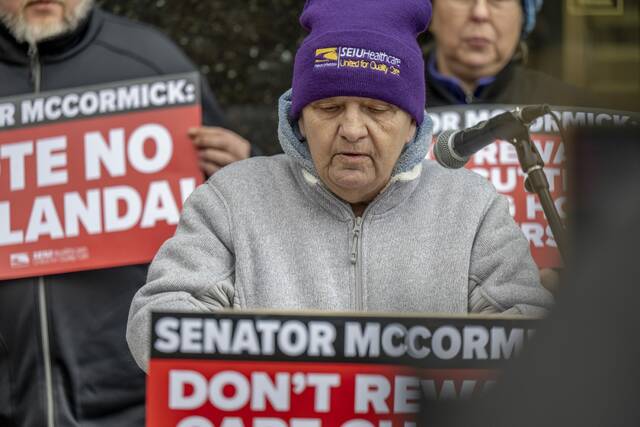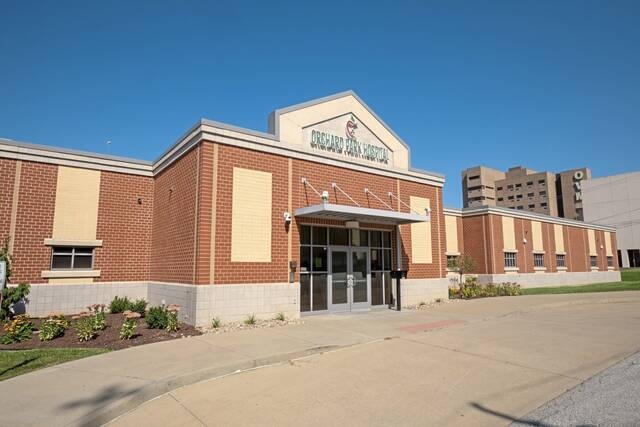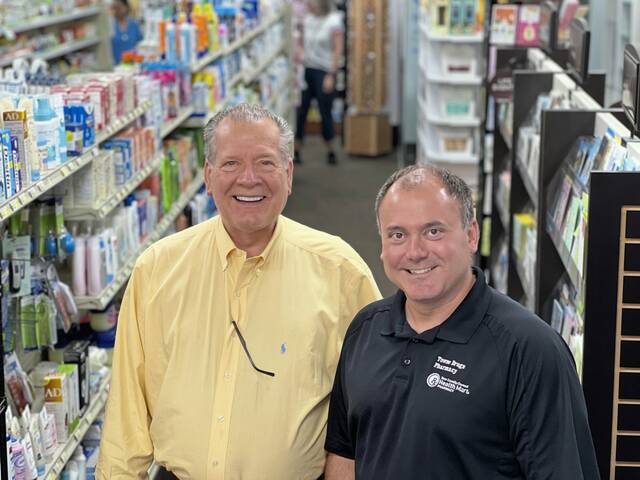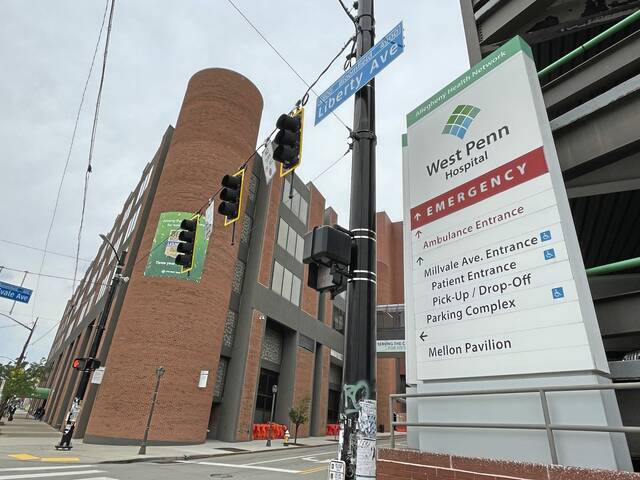For Dusty Donaldson, one journey led to another.
After navigating the emotional path of a lung cancer diagnosis, operation, chemotherapy and recovery, Donaldson decided to travel down another road. She purchased a Ford Transit Connect van and drove across the country to create awareness for early detection of lung cancer.
Donaldson planned to drive 12,000-plus miles and make 45 stops herself for what she called a lung cancer survivor’s 20-year “Journey Across America.” When the trip became a little rough with strong winds in New Mexico, Donaldson reached out for help. A member of the video crew documenting the trip flew in to help drive.
“Just like with a cancer diagnosis, you can’t do something this daunting alone,” Donaldson, 71, said on Oct. 25 as she stood on the 10th Street Bridge on Pittsburgh’s South Side. “You need help. I learned there are similarities between this ‘Journey Across America’ trip and a cancer journey. We think we got it and with the physical challenges, the emotional challenges, the psychological challenges, at some point, we need help. You learn you can’t do it alone.”
Asking for help
Donaldson, who lives in High Point, N.C., wants to help others, which is why she founded The Dusty Joy Foundation, known as LiveLung, in 2010. It is a non-profit organization that hosts educational programs in person and online to connect a network of patient groups throughout the country.
Donaldson had lunch with members of the Pittsburgh group at Twelve Whiskey BBQ on the South Side. Joi Kiley, of McCandless, who was diagnosed in 2022, found LiveLung online.
“It is great to have someone to talk to,” Kiley said. “To meet Dusty and others is comforting. They’ve become my extended family. They are my backbone. They give me the support I need.”
Kiley said she is lucky her cancer was found early. With a history of other cancers in her family, she talked to her doctor about getting checked. She had a smoking history and said she knew she had to quit.
Hard habit to break
Stopping smoking isn’t easy, said Dr. Benny Weksler, system director for thoracic surgery for Allegheny Health Network.
“Addiction to nicotine is very hard to break,” he said.
It often needs a combination of medications and behavioral therapy, he said. He said 17% of the U.S. population smokes and 90% of lung cancer cases are caused by cigarette smoking. Lung cancer kills more people in the country than colon and pancreatic cancer combined, he said. There are 230,000 deaths per year in the U.S. from lung cancer, Weksler said.
“I strongly support (Dusty),” Weksler said. “She makes a good case. I understand her passion and advocacy.”
He said if someone is a smoker, they should be screened with a CT scan (formerly known as a CAT scan), which has a 20% reduction in mortality.
The challenge comes with non-smokers, Weksler said. A low-dose CT scan, even though it is significantly less radiation than a high-dose CT scan, it is still equivalent to 10 chest X-rays, Weksler said.
“With lung cancer, it is mostly smokers who are at risk,” Weksler said. “Submitting a large population of people to radiation without the known benefit is more risk than anything else.”
Lung cancer screening in non-smokers is different than breast cancer screening with mammograms.
“As women age, all women are at risk for breast cancer,” Weksler said. “In non-smokers, there is a low risk of lung cancer.”
He and Donaldson said many people attribute the disease caused by smoking as a “choice,” not fully understanding the addiction involved in smoking cigarettes. And there is a stigma attached to lung cancer.
Anyone can get lung cancer, Donaldson said.
“We need to come up with better ways of screening for those who don’t fit the guidelines, such as non-smokers who may have a family history of lung cancer,” Donaldson said. “We’re not there yet.”
She suggests getting a baseline test and those having exposure to radon and other carcinogens should be considered for testing. And she’s advocating to have such tests covered by insurance.
Donaldson quit smoking 26 years before she was diagnosed.
Her cancer was found in 2005 when she went for an annual physical with a swollen lymph node in her neck. Her doctor initially thought she had pneumonia and he gave her the option to do additional testing, which she decided to do.
Donaldson had the upper and middle right lobes of her lung removed and chemotherapy. She said she breathes fine and can do most things, except run. She urges people that if they feel something isn’t right about their body to see their doctor.
Currently, adults aged 50-80 who have smoked on average a pack of cigarettes a day for 20 years are recommended to have an annual lung cancer screening.
“I didn’t have a cough,” said Donaldson. “I didn’t have sniffles, I hadn’t had a cold in years. The doctor was shocked and I was shocked. I learned right away that we really needed a voice for lung cancer advocacy. I wanted to make a difference while I was able.”
Lung Cancer Awareness Month
Donaldson’s trip coincides with Lung Cancer Awareness Month in November.
“Lung cancer has come a long way but it’s still a very high mortality rate,” Donaldson said. “I am a survivor and I want everyone to survive.”
Her trip began on Sept. 25 from North Carolina. She traveled to California and Canada, meeting with survivors, visiting cancer centers and sharing stories. Industry partners AstraZeneca, Amgen and Summit Therapeutics are helping to fund the trip.
The van has an image of LiveLung’s mascot, a cat named Skan and she calls the vehicle the skan van.
“You know, because dogs can’t screen for lung cancer but cats can,” Donaldson said. “That’s how you screen for lung cancer, with a cat scan.”
After leaving Pittsburgh, she drove to New York and Washington, D.C. The journey concluded at the LiveLung Survivorship Summit in Charlotte, N.C.
Documenting the trip
Video documenting the experience was Donaldson’s daughter, Kimberly Lester’s, idea. It will be a tribute to the unsung heroes of the lung cancer movement and the survivors whose stories offer hope and inspiration. Lester said her mother is an inspiration. Lester is also an advocate for the guidelines for screening to be expanded. One of the toughest parts was when her mom told people she had lung cancer was that the first thing most said was, “I didn’t know you smoked.”
“She felt like this was a gut punch,” said Lester, who lives in Virginia. “It’s a stigma. Sometimes people with lung cancer don’t want to talk about it because they are embarrassed. We want to shed light in dark places and let these people know they are not alone. We need a sisterhood like there is with breast cancer.”
The mother and daughter co-authored “The ABCs of Lung Cancer: for Patients and Advocates,” a book that offers practical tips for patients and caregivers, personal reflections and prevention advice.
Lester followed her mother through the sharing of her location on her smartphone.
“When she did ask for help, that brought me comfort that she was willing to do that,” Lester said. “She’s really gotten energized from this journey. She loves to connect people. It is an instant camaraderie. She loves bringing people together and sharing information and hopefully making a difference in someone’s life.”


